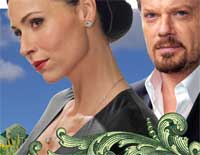The FX drama series The Riches,about husband-and-wife con-artist gypsies who steal the identities of a well-to-do dead couple, returns for its second season tonight at 10 ET. It's a wonderful series, but it made me wonder: When, exactly, did we start rooting for the gypsies, tramps and thieves in our weekly TV dramas?
 While you ponder that for a minute, allow me to make this quick point. The Riches, starring Eddie Izzard and Minnie Driver, is a delightful show -- cacklingly funny one minute, frighteningly and realistically violent and scary the next. For a fuller review of why I love this show, listen to today's Fresh Air with Terry Gross.
While you ponder that for a minute, allow me to make this quick point. The Riches, starring Eddie Izzard and Minnie Driver, is a delightful show -- cacklingly funny one minute, frighteningly and realistically violent and scary the next. For a fuller review of why I love this show, listen to today's Fresh Air with Terry Gross.
And now, back to the question of the day.
What the Malloys are doing in this series -- hiding some dead bodies and assuming their identities -- is clearly wrong. When Pete, an old friend of the real Riches, comes to town and threatens to expose the impostors, Pete actually is the good guy. Yet we're rooting for Wayne... a.k.a. the new Doug Rich... to find a way out.
Similarly, on Breaking Bad, we rooted for the terminally ill Walter White, even though he had decided to set up his wife and son by making and selling crystal meth. Walter's brother-in-law, a cop, is closing in on him, but it's Walt we want to emerge victoriously. And on Dexter, who among us isn't on the side of this serial killer, just because he kills even more despicable serial killers?
The obvious lineage is James Gandolfini's Tony Soprano on The Sopranos, which began in 1999. He's a mob boss who had our sympathies, until he did something so heinous we recoiled at the sight. But then, like a battered spouse, we absorbed the blows and stayed put for more, even offering more love.
But before Tony, there was Adrian Pasdar's creepy Jim Profit in 1996's Profit. Before Profit, there was Gary Cole's demonic Sheriff Lucas Buck in 1995's American Gothic. Before Lucas, there was Kyle Secor's Tim Bayliss, the hero turned murderer on 1993's Homicide: Life on the Street. Before Bayliss, there was Terence Knox's Peter White, the doctor turned rapist on 1982's St. Elsewhere. And before White, there was that rascally oilman, Larry Hagman's J.R. Ewing, in 1978's Dallas.
J.R. may have been the original bad boy of weekly TV dramas -- the guy you loved to watch, and even root for, even though you knew his sense of morality was hopelessly skewed. But there may have been others, and I've addressed only the male half of the equation. Certainly, Joan Collins in Dynasty did her share of villainous damage in the 1980s -- but who, male or female, gets credit as the very first significant bad boy, or bad girl, of weekly prime-time series TV?
The floor is yours.